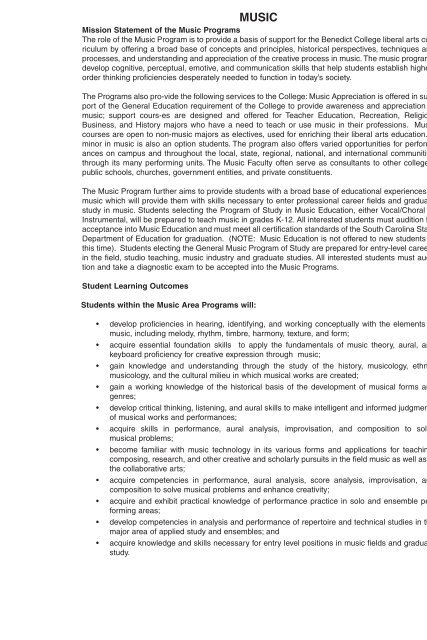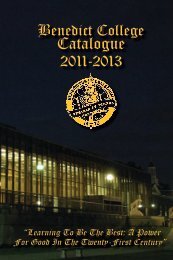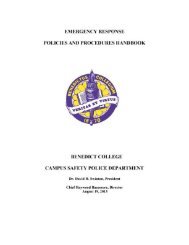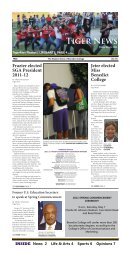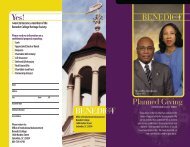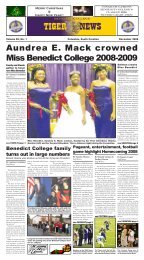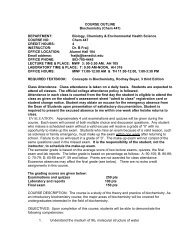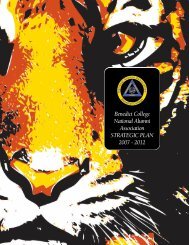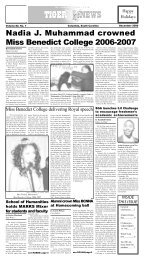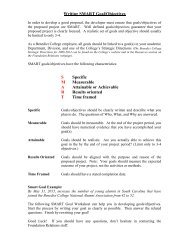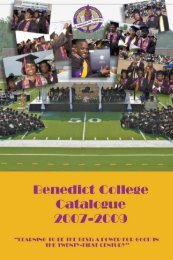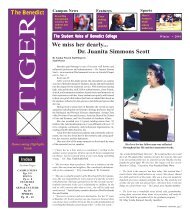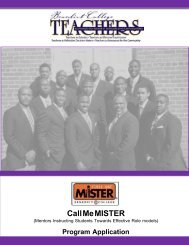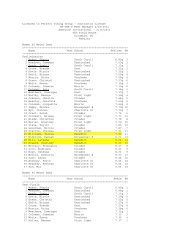2009-2011 - Benedict College
2009-2011 - Benedict College
2009-2011 - Benedict College
Create successful ePaper yourself
Turn your PDF publications into a flip-book with our unique Google optimized e-Paper software.
160 FINE ARTS DEPARTMENT<br />
MUSIC<br />
Mission Statement of the Music Programs<br />
The role of the Music Program is to provide a basis of support for the <strong>Benedict</strong> <strong>College</strong> liberal arts curriculum<br />
by offering a broad base of concepts and principles, historical perspectives, techniques and<br />
processes, and understanding and appreciation of the creative process in music. The music programs<br />
develop cognitive, perceptual, emotive, and communication skills that help students establish higherorder<br />
thinking proficiencies desperately needed to function in today’s society.<br />
The Programs also pro-vide the following services to the <strong>College</strong>: Music Appreciation is offered in support<br />
of the General Education requirement of the <strong>College</strong> to provide awareness and appreciation of<br />
music; support cours-es are designed and offered for Teacher Education, Recreation, Religion,<br />
Business, and History majors who have a need to teach or use music in their professions. Music<br />
courses are open to non-music majors as electives, used for enriching their liberal arts education. A<br />
minor in music is also an option students. The program also offers varied opportunities for performances<br />
on campus and throughout the local, state, regional, national, and international communities<br />
through its many performing units. The Music Faculty often serve as consultants to other colleges,<br />
public schools, churches, government entities, and private constituents.<br />
The Music Program further aims to provide students with a broad base of educational experiences in<br />
music which will provide them with skills necessary to enter professional career fields and graduate<br />
study in music. Students selecting the Program of Study in Music Education, either Vocal/Choral or<br />
Instrumental, will be prepared to teach music in grades K-12. All interested students must audition for<br />
acceptance into Music Education and must meet all certification standards of the South Carolina State<br />
Department of Education for graduation. (NOTE: Music Education is not offered to new students at<br />
this time). Students electing the General Music Program of Study are prepared for entry-level careers<br />
in the field, studio teaching, music industry and graduate studies. All interested students must audition<br />
and take a diagnostic exam to be accepted into the Music Programs.<br />
Student Learning Outcomes<br />
Students within the Music Area Programs will:<br />
• develop proficiencies in hearing, identifying, and working conceptually with the elements of<br />
music, including melody, rhythm, timbre, harmony, texture, and form;<br />
• acquire essential foundation skills to apply the fundamentals of music theory, aural, and<br />
keyboard proficiency for creative expression through music;<br />
• gain knowledge and understanding through the study of the history, musicology, ethnomusicology,<br />
and the cultural milieu in which musical works are created;<br />
• gain a working knowledge of the historical basis of the development of musical forms and<br />
genres;<br />
• develop critical thinking, listening, and aural skills to make intelligent and informed judgments<br />
of musical works and performances;<br />
• acquire skills in performance, aural analysis, improvisation, and composition to solve<br />
musical problems;<br />
• become familiar with music technology in its various forms and applications for teaching,<br />
composing, research, and other creative and scholarly pursuits in the field music as well as in<br />
the collaborative arts;<br />
• acquire competencies in performance, aural analysis, score analysis, improvisation, and<br />
composition to solve musical problems and enhance creativity;<br />
• acquire and exhibit practical knowledge of performance practice in solo and ensemble performing<br />
areas;<br />
• develop competencies in analysis and performance of repertoire and technical studies in the<br />
major area of applied study and ensembles; and<br />
• acquire knowledge and skills necessary for entry level positions in music fields and graduate<br />
study.


